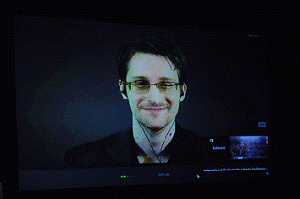See original here
RT: Mark, how did the government's attack on whistleblower Thomas Andrews Drake impact on the reactions which Edward Snowden would later take against the NSA?
Mark Hertsgaard: Snowden has said numerous times that without Thomas Drake there would have been no Edward Snowden. And that's because Drake was a much higher official within the NSA. But 10 years earlier than Snowden he tried to blow the whistle on the very same allegations as Snowden later revealed -- the mass surveillance undertaken without legal warrants by the National Security Agency of the United States. And what's new about these revelations that appeared in The Guardian and in my book Bravehearts this week is that we now know the inside story of what happened inside the Pentagon.
And essentially it confirms exactly what Snowden suspected -- which is that any whistleblower inside the Pentagon who tried to raise serious concerns about US policy by going through official channels, by following the rules, by trust in the whistleblower laws, that a whistleblower was very likely to end up crushed as Thomas Drake did. And these new revelations coming from John Crane, the former Assistant Inspector General at the Pentagon tell us in quite specific detail how high-up Pentagon officials repeatedly broke the law in their handling of Thomas Drake's whistleblowing case, including by withholding and destroying documents, and lying to a Federal judge and other clear crimes and felonies. So, that is really what has come to light this week.
RT: How and if whistleblowers were dissuaded from coming forward, and if you witnessed any successful cases where someone sort of followed the rules, did everything go through proper channels and they were successful in blowing the whistle?
John Crane: Thomas Drake.
Mark Hertsgaard: At first. It looked like a success for a little while there.
John Crane: And he followed all of channels that he should have followed, that we had what we now call the "4+1" whistleblower revelations. And what that meant was four separate whistleblowers stepped forward, filed complaints and then they said that there was a separate whistleblower in the NSA who wanted to be confidential. Based upon their allegations, we then contacted Congress because these were allegations against a multi-billion dollar program that was years behind schedule, that wasn't meeting acquisition milestones. So, we knew that we had Congress who is concerned. And then we had the whistleblowers stepping forward. We had a full formal audit of it that was issued in 2004. And that audit largely substantiated everything Thomas Drake said. That audit resulted in a multi-billion dollar system fundamentally being shut down by the Congress. So, he would be one of the Inspector General's success stories.
RT: Mark, what do you think is the most significant of the Edward Snowden revelations? Because on the one hand, they opened up the eyes of so many, especially younger generations to intelligence the industry apparatus. But on the other hand, the government's reaction has caused such a chill to others coming forward... Anybody who would dare to be a whistleblower now probably is one of the bravest people on the planet...
Mark Hertsgaard: It's interesting you say that because the last chapter of my book talks about how Snowden actually had two goals when he blew the whistle: it wasn't just to alert people to this massive surveillance that was being conducted against them without their knowledge, much less their consent; but Snowden also wanted to encourage other whistleblowers, he wanted to show that you could come forward with important information, follow your conscience and that you didn't have to hide...





